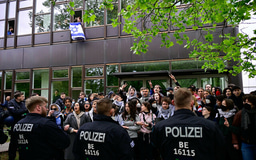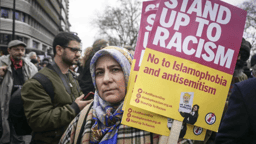The Challenges Facing Vergangenheitsbewältigung in Modern Germany – Summer One Research Project Reflective Report

Introduction
My Laidlaw Summer One research project explores the impact of the ever-evolving and increasingly brutal conflict between Israel and Palestine in Germany, a country defined by its genocidally antisemitic history and its significant population of Muslim background migrants. I examined the status of antisemitism, Islamophobia and (Muslim) migrant integration in modern Germany, analysed the successes and failures of existing methods of dealing with problems in these areas and drew up recommendations to improve Germany’s approach to such topics.
Structure and Methodology
As outlined in my original research proposal, my project consisted of two sections. The first part focussed on desk-based research. I examined a wide variety of sources – including academic publications, news articles, opinion pieces and reports by governmental and non-governmental organisations – to assess the current status of antisemitism, Islamophobia and migrant integration in Germany. I also investigated the format and composition of programmes aimed at tackling issues in these areas, specifically regarding the prevention of antisemitism and Islamophobia and the efficacy of integration. I assessed the merits and failures of these approaches and proposed modifications to achieve a more positive circumstance.
The second part of my proposed research employed a qualitative technique based on thirty-minute interviews (online, recorded, in German) with between five and ten Berlin-based Muslim Germans (aged 18–25) with a migrant background. These were to incorporate both predetermined questions and open discussion. In particular, I wanted to examine how the recent conflict in Gaza has affected the issues outlined in the project.
I had a detailed plan for time structure and management. Each week was dedicated to a specific research task and theme; for example, I set week one aside to contact organisations for participants and to prepare for the interviews, which I felt was a reasonable workload for this period. However, I also ensured that the plan was flexible and would not be derailed due to unavoidable or unforeseen temporal and other factors.
Comparison Between My Original Proposal and My Final Project
The interview component of my project developed along a significantly different path than I had anticipated. To locate interviewees, I contacted student organisations at Berlin universities, Muslim-focused community centres and NGOs, inviting those interested to get in touch. However, I immediately encountered a problem: only four (of twenty) organisations replied to my enquiry and none were able to participate. The unforeseen difficulty of this experience also encouraged me to reflect on the likelihood of finding participants who would be able to dedicate the significant amount of time required for an interview. Based on these considerations, I modified my approach. Instead of interviews, I created an online questionnaire; instead of contacting the aforementioned organisations, I utilised existing personal connections. Furthermore, I expanded my location range (from Berlin to Germany as a whole) and adapted the time scale for completion of the questionnaire, in the hope of attracting a greater audience. I intend to continue distributing the questionnaire throughout the remaining duration of my Laidlaw Scholarship, as I believe that I will meet further relevant participants in my coming Erasmus exchange in Germany. The fact that the results are still ongoing at the end of the six-week research period does not pose an issue. Overall, this experience taught me the importance of adaptability, flexibility and innovation in research. I am content with the outcome of this element of my project, even if the process did not run as smoothly as expected.
In addition, my project's scope evolved to focus more on migration and integration issues than I had initially planned. There are two main reasons for this. First, I realised that it was necessary to investigate this area to produce an accurate assessment of the situation facing Muslim-background migrants in Germany, in the context of integration, belonging and discrimination. A full evaluation of the situation was essential for me to be able to propose fitting approaches. Second, I discovered that I have a great interest in this subject. Alongside my research, my simultaneous participation in the Fáilte Isteach Trinity English Conversation Classes (designed for migrants and refugees learning English in Dublin) contributed to my desire and ability to learn more. Not only did a short training course outline some of the principles of working with migrants and refugees, but I was also able to hear first-hand about various experiences of migration and integration in Ireland. Through this, I could explore comparisons and contrasts with the situation of Muslim-background migrants in Germany. Therefore, out of necessity and personal interest, my project developed in a way that I had not expected at the outset.
Findings
My assessment of the current climate in Germany allowed me to summarise the prevailing situation in the areas of antisemitism, Islamophobia and migrant integration. First, antisemitism is on the rise in Germany, notably since 7th October 2023. This trend manifests itself in different ways among different communities: on the right, as traditional racism; on the left, as antizionist antisemitism; and within Muslim communities, to a slightly higher level than among other sections of the population, but also varying based on factors such as country of origin, generation of migration, religiosity and gender. Similarly, Islamophobia is growing in the societal, cultural and political realms. This is often linked to the rise of the far-right, but is also inherent in the government’s reaction to the Israel-Palestine conflict, notably the blaming of Muslims for reintroducing antisemitism to Germany. In terms of (Muslim) migrant integration, there exists a clear link between lack of integration (partly caused by a strict and often exclusionary interpretation of Vergangenheitsbewältigung) and antisemitism; therefore, these issues must be tackled in conjunction with each other. It is important to note that this situation varies due to number of factors, including location (notably East or West Germany), age and political orientation, and is ever evolving in light of current affairs. Furthermore, there also exist instances of intercultural cooperation.
My examination of existing methods of tackling problems in the fields of antisemitism, Islamophobia and migrant integration – specifically with regards to educational programmes and the doctrine of Vergangenheitsbewältigung – reached the conclusion that existing approaches serve to worsen the situation in both areas. Regarding Vergangenheitsbewältigung, the emphasis on personal, familial guilt for Nazi crimes and Germany’s staunch support for Israel’s actions in Gaza (regardless of human rights violations) proved particularly problematic; regarding education, the singling out and occasional chastisement of Muslim students during Holocaust education appeared the main problem area. Overall, existing approaches highlight the differences between Muslims and Jews in a German context, whereas an improved approach should focus on areas of unity and cooperation. Therefore, antisemitism, Islamophobia and (Muslim) migrant integration appear inextricably linked.
From this assessment, I produced a detailed list of recommendations for each of the aforementioned areas. I look forward to implementing these in my LiA project.
Next Steps
Primarily, the next step from my Summer One research project is to implement my experiences and findings into my Summer Two LiA project. In my application, I outlined my plans to work with a German NGO that tackles – in a community-based setting – the themes present in my research, namely antisemitism, Islamophobia and integration. Organisations that I intended to contact included Stiftung EVZ, Amadeu Antonio Stiftung and Kreuzberger Initiative gegen Antisemitismus. Having completed my Summer One research project, I still believe that this is the natural route of progression. However, given my project’s evolution in the direction of migrant issues and integration, I now intend to widen the scope of my enquiries accordingly. I feel that experience in this area will be highly valuable both for my project and for my career prospects, as it is relevant not only to the specific context of Jewish-Muslim relations and migrant integration, but also to other fields of humanitarian studies (obviously with specified modifications). Although I am still in the pre-planning stages of my LiA, I look forward to finding out where it will take me.
Alongside my LiA, I intend to continue developing my interest in themes relevant to my research project in an academic context. I am considering Master’s Programmes in Migration Studies, Humanitarian Studies and International Relations: my Laidlaw research has cemented my interest in these topics and inspired me to formally pursue them further.
Achievements and Challenges
I feel that my Summer One research project included a variety of achievements, of which I am proud. First, I referred to my Personal Development Plan (PDP) throughout the duration of the project, sticking to the core values that I had outlined. I achieved equality and fairness by keeping an open mind while researching a variety of sources; empathy, by attempting to understand from an outside perspective; adaptability, by persevering in the face of difficulties (for example with the interview component); and honesty and trust, by trusting the responses of those who completed the questionnaire. Furthermore, the research process helped me to gain confidence in my own knowledge and ability, something that I had identified as an area for development. As well as developing new strengths, I also played on ones that I believed I already had; notably, I created a well-informed and adaptable plan and approached the research process in an organised manner. Alongside this, I consider my adaptability, flexibility and perseverance when faced with difficulties (for example with interviews) a significant achievement. I completed all the necessary work within the prescribed time scale (although the questionnaire is still ongoing, this does not require input from me) and examined and drew conclusions regarding an underexplored area.
However, my project also included several challenges. Although I produced well-informed conclusions and recommendations, these are difficult to implement due to the ever-evolving, politicised and highly divisive nature of the topic. Therefore, further research would be necessary to effectively realise my findings. Furthermore, I struggled to act on some areas of my PDP. Notably, I had highlighted that I wanted to develop my ability to successfully communicate ideas; this remained mostly unfulfilled, as my solo research project did not provide a fitting opportunity. However, I believe my LiA project will offer ample chances to develop both of these areas.
I also encountered some barriers in the actual research process. I occasionally found it difficult to maintain motivation during six weeks of library-based research. In addition, although I speak German at a C1 level, I sometimes encountered a language barrier, particularly when working with specialised or highly colloquial source material. Nonetheless, I feel that I attempted to find solutions to these challenges. Notably, working alongside others, talking to fellow Laidlaw scholars and reminding myself of my passion for the topic increased my motivation, while making a conscious effort to improve my German – for example by attending a summer course in Potsdam, Germany funded by the DAAD – undoubtedly helped to overcome linguistic issues. Therefore, although I faced challenges in Summer One, I believe that I was largely able to persevere and implement solutions.
What I Learnt About Myself as a Leader and About My Perspective on Leadership
The major success of my research project in terms of the leadership philosophy of the Laidlaw programme is my increased understanding of the importance of self-assessment, adaptability and sympathy in leadership. My topic – which focuses on highly sensitive issues within marginalised minority communities – showed me that it is necessary to evaluate your personal strengths to assess the ways in which you are best suited to lead. You should then modify your role accordingly. For example, as a white British woman from a Christian cultural background, I would likely not be the best person to lead a workshop of Palestinian Muslim refugees; in this case, the best example of leadership would be to step aside and offer support in other ways. On the other hand, there exist contexts in which my objectivity as a non-German would be useful and allow me to occupy a more direct leadership position. I feel that this principle is especially important when leadership is motivated by a desire to help and to create societal change: it can be easy to think that you're doing the right thing, but it is pivotal to listen to and act on the advice of those who experience the issue firsthand. I am grateful that my research led me to this conclusion, which I look forward to setting into practice during my LiA project.
Conclusion
Overall, I believe that my Summer One research project was a success. I closely investigated the status of antisemitism, Islamophobia and migrant integration in modern Germany, drew detailed conclusions about the problems in these areas and produced recommendations to improve the situation based on my findings. Furthermore, although I faced some challenges – for example with the interviews – I was able to implement solutions to overcome them. I am grateful to the Laidlaw Foundation for enabling me to carry out this project and look forward to furthering my research throughout the remainder of the scholarship.


Please sign in
If you are a registered user on Laidlaw Scholars Network, please sign in